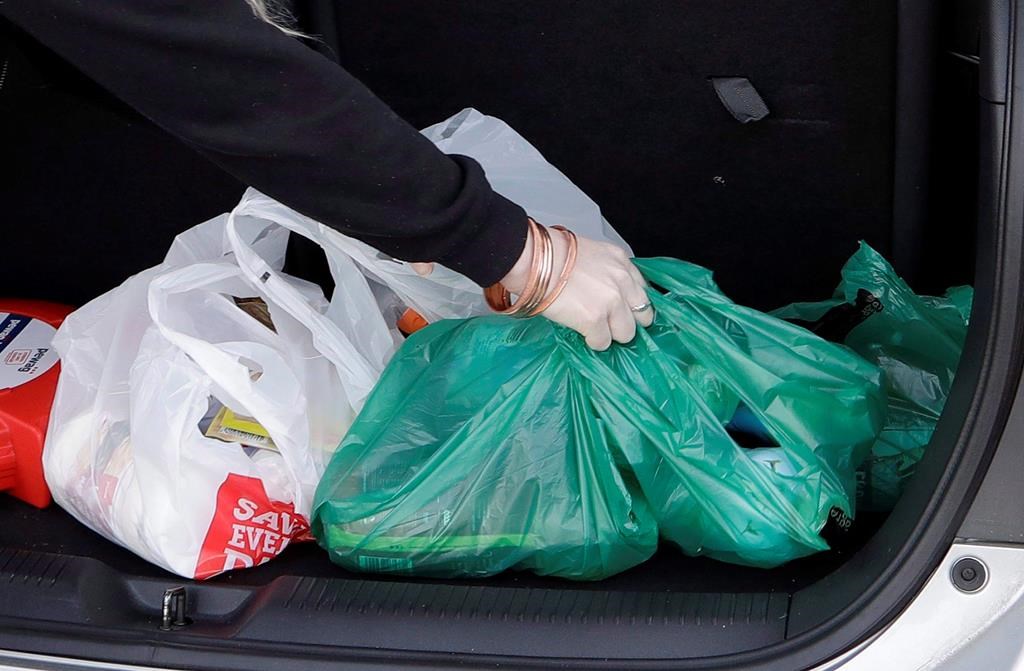The B.C. government wants the public to help them craft strategies aimed at reducing single-use plastics, which could include an outright ban on some items.

The province launched an online survey Thursday, allowing people to give their opinions on what kinds of plastic items could be banned across B.C., and how other items could be better recycled and reduced to curb plastic waste.
The survey, which will run until Sept. 18, comes as more B.C. municipalities work to ban items like plastic bags, straws and food containers.
WATCH: (Aired June 28) B.C.’s homegrown solutions to plastic problem

“The message from British Columbians is loud and clear — we need to take action to reduce plastic waste,” Minister of Environment and Climate Change Strategy George Heyman said in a media release.
“We have all seen the striking images of animals and fish being caught up in everyday plastic waste like grocery bags or beer can loops that ensnare these beautiful creatures and it cannot continue.”
The survey asks questions in four “connected areas,” the first of which covered a proposed ban on single-use plastic bags and other packaging.
Styrofoam containers and cups are also being considered as items to ban.
- Invasive strep: ‘Don’t wait’ to seek care, N.S. woman warns on long road to recovery
- Ontario First Nation declares state of emergency amid skyrocketing benzene levels
- T. Rex an intelligent tool-user and culture-builder? Not so fast, says new U of A research
- Nearly 200 fossil fuel, chemical lobbyists to join plastic treaty talks in Ottawa
If a plastic bag ban is approved, B.C. will become the third province to take that action after Prince Edward Island and Newfoundland and Labrador.
The other areas covered by the survey are ways to reduce single-use plastics in landfills and waterways, getting more items recycled and reducing plastic waste overall.
One of the ideas being considered is increasing the refundable deposit fee for bottles and cans to 10 cents, and applying that fee to milk jugs.
Electronic refunds for empty bottle returns are also being considered in order to further ease the burden of recycling.
The overall goal, B.C. Green Leader Andrew Weaver said in a statement, is to keep plastic pollution out of marine areas and landfills.
WATCH: (Aired June 10) Questions about federal ban on single-use plastics

“We have a responsibility to British Columbians to curb the significant impacts of plastic pollution on our environment and marine life,” Weaver said.
“Taking action on plastic waste is a priority the B.C. Green caucus shares with this government, as well as with the local governments that have already shown leadership in this area.”
The provincial survey follows the launch of Vancouver’s own questionnaire earlier this month that will help inform a municipal ban on plastic bags, along with fees for paper and reusable bags.
That plan is closely modeled after Victoria’s plastic bag ban that came into effect last July. The bylaw was recently struck down after the B.C. Court of Appeal found the city did not get permission from the province.
Both the city and the province said they are reviewing the decision, which is based on a rule in the province’s Community Charter that mandates what decisions municipalities can make on their own.
The North Okanagan has said it will move forward on its own plastic bag ban despite the court ruling.
In a joint statement, the mayors of Victoria, Tofino, Squamish and Rossland applauded the provincial engagement and offered their experience and expertise.
“Our communities have enthusiastically embraced the reduction of single-use plastic items,”
We have adopted bylaws or are in the process of doing so to prohibit single-use plastic bags,” mayors Lisa Helps, Josie Osborne, Karen Elliot and Kathy Moore said.
“We’ve done this because single-use plastics and other single-use items present a huge problem and big expense in solid waste management, which is a local government responsibility.”
Tofino and Ucluelet also have bans on plastic bags and straws in place, while Squamish and Rossland are working towards their own bans.
Vancouver is also moving towards banning plastic straws and Styrofoam containers starting next year.
Surrey, New Westminster and Salmon Arm are working towards their own city-wide bans on plastic bags.
The federal government has said it is exploring a Canada-wide reduction strategy for single-use plastics, including a potential plastic bag ban, by 2021.




Comments